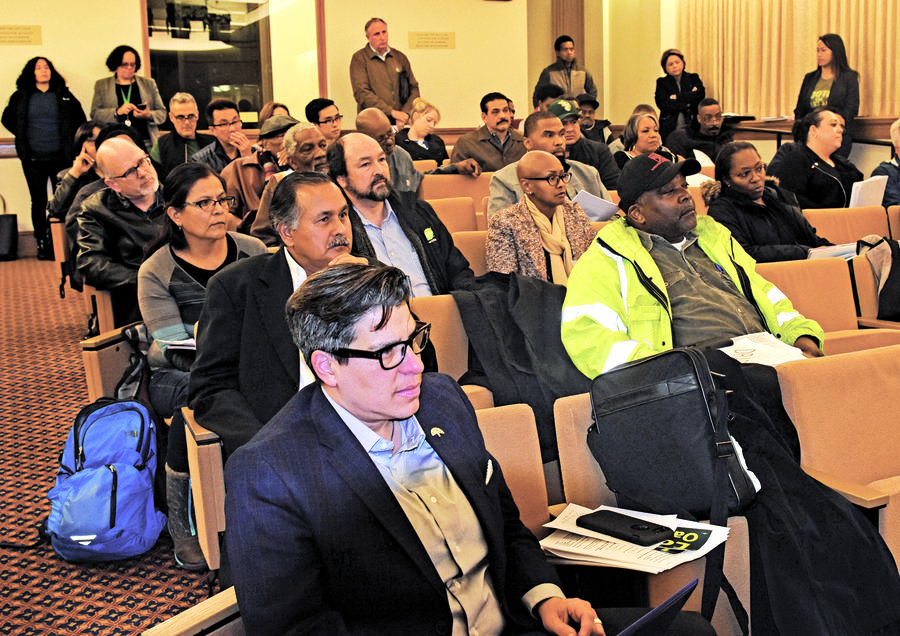City staff, along with Councilmembers Rebecca Kaplan (front left) and Abel Guillén, hosted a meeting Monday evening at City Hall to hear community feedback on proposed changes for a new labor agreement for development on city-owned lands. Photo by Ken Epstein.
City of Oakland staff held a meeting this week to discuss a proposed public lands policy, which would include a labor agreement with the Alameda County Building Trades Council that some critics fear would undermine the few jobs that exist for African-American construction workers on city-connected projects.
The proposal, as written by Councilmember Abel Guillén, would expand the coverage of the city’s current Local Employment Policy, which at present only applies to subsidized, non-market deals.
If adopted, the policy would apply to all projects involving sale or lease of city-owned land.
The Project Labor Agreement (PLA) between the city and the building trades unions would cover all projects of 80 or more housing units or with an estimated construction cost of $40 million or more.
The proposal would require the Building Trades Council to submit a report to the city within six months after the agreement is signed containing the race, ethnicity, gender and percentage of Oakland residents of each union affiliated with the labor council.
Councilmembers Guillén and Rebecca Kaplan co-sponsored the meeting.
Guillén, who chaired the discussion, explained that he has been working on the public lands policy for over a year. He said the city should strike a balance between selling property for top dollar and requiring public benefits, which would limit the amount of money the city can earn.
“Selling property gets the most money,” he said. “If we want too much, we don’t get the money. [We must] balance a public lands policy with a jobs policy.”
Under the current jobs policy, 88 percent of work on city-connected projects go to union workers, and the balance goes to nonunion or mixed nonunion and union.
Guillén said his proposal would be finalized and sent to the council for discussion and revision. He is suggesting the city pass a policy and then evaluate it after five projects in a few years “to see how we did on local hiring,” he said.
Kaplan emphasized that a new jobs policy should guarantee equity—jobs for Black construction workers and black-owned construction firms, minority workers and for women—and keep money in the local community.
“I appreciate the opportunity to participate in the jobs policy input meeting, and the thoughtful comments and suggestions made by attendees,” Kaplan said in an interview with the Oakland Post.
“I believe we can, and should, work to bring forward jobs policies for public lands that incorporate all of our community, including other issues like ‘ban the box’ as well,” she said. “We also need to continue to work to expand opportunity to get into good-paying jobs in growing construction, including apprenticeship opportunities for Oaklanders.”
Community speakers at the meeting—including representatives of small construction firms—questioned the city’s commitment to equity, based on its past track record.
“How do minority contractors in Oakland get access to contracts, especially on public land? We’re not included. We’re [always] after the fact, and it’s too late,” said Pete Varma, president of the Northern California Chapter of the National Association of Minority Contractors.
“Every time they try out something, Black contractors are left out,” said Louis Summerhill.
“How many Black contractors were involved in putting this [proposal] together?” He asked.
“This isn’t a new conversation. We are the last hired and the first fired, and it hasn’t changed,” said Eddie Dillard.
Several speakers questioned whether a new policy would make a difference if it is not enforced.
The problem with a project labor agreement, according to critics, is that contractors hire workers through hiring halls run by the building trades unions for their members, which are predominately white and have always been segregated.
As a result, African-American construction workers – no matter how experienced – tend not to be union members and have little access to union jobs. Black workers tend to work for non-union, Black-owned small construction firms.
Those job opportunities could be eliminated by a PLA.
The language of Guillén’s proposal allows non-union firms to work on city-associated projects, but “non-union contractors must make first hires from the union hall.”
The firms can then hire a “maximum of five core employees” of their firms, and after that, “All future hires are from the hiring hall.”
As a result, the PLA could mean that almost no Black workers would be able to work on city projects.
Statistics released by the city several years ago show that five percent of construction jobs on city projects went to Black workers. The Oakland Post in October requested current data from the city but has not yet received it.
According to Robyn Hodges, a member of OaklandWorks attended the meeting.
“Oakland is never going to realize equity as along as the Building Trades are writing the rules,” she said. “This plan needs to be tossed out and rewritten, the same way we did with the Army Base Project.
“This needs to become a more open process. If we keep going to the same meetings with the same people, we will be getting the same results.”



 Activism4 weeks ago
Activism4 weeks ago
 Activism4 weeks ago
Activism4 weeks ago
 Alameda County4 weeks ago
Alameda County4 weeks ago
 Activism4 weeks ago
Activism4 weeks ago
 Alameda County4 weeks ago
Alameda County4 weeks ago
 Activism4 weeks ago
Activism4 weeks ago
 Activism4 weeks ago
Activism4 weeks ago
 Activism3 weeks ago
Activism3 weeks ago


















































